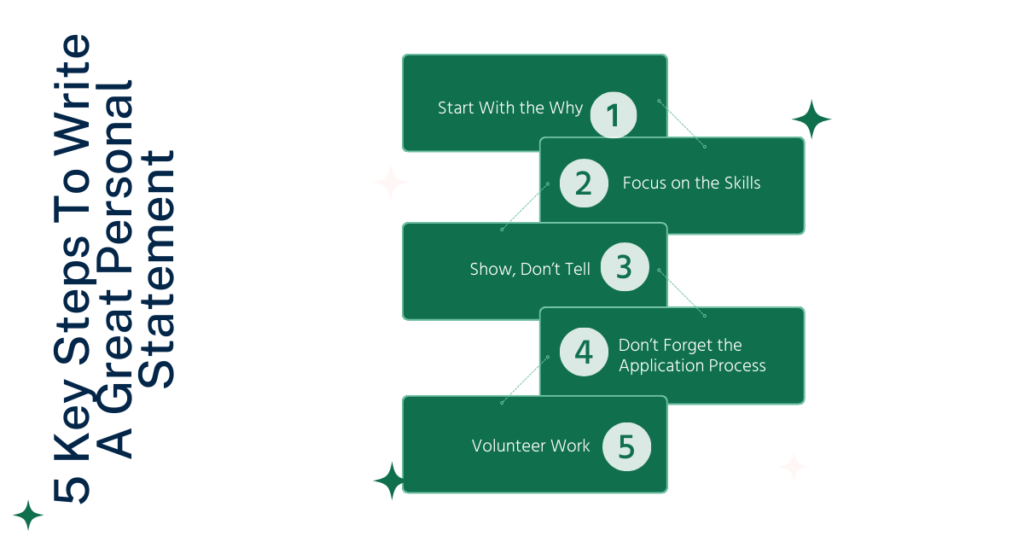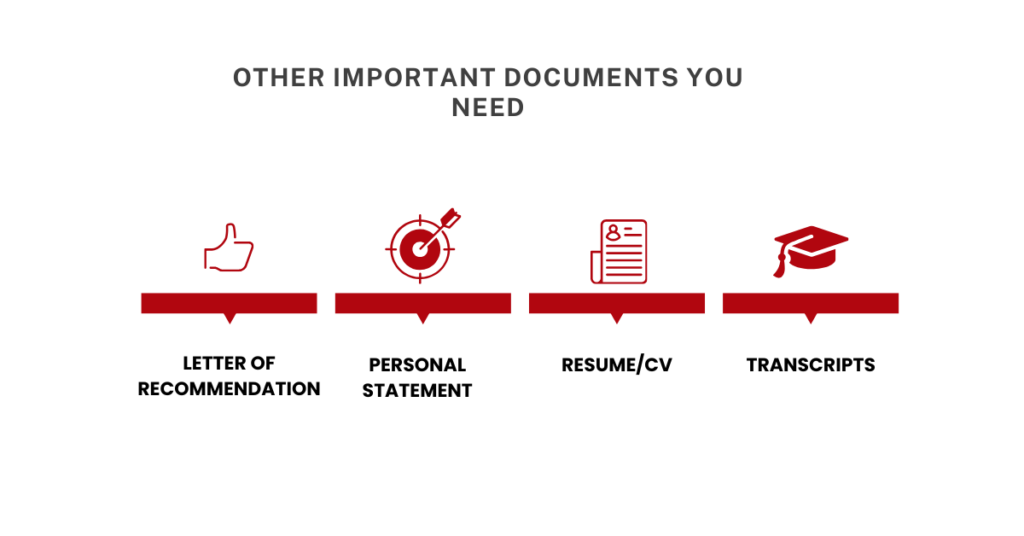14 August 2025
7 minutes read
How To Write A UCAS Personal Statement For University Admission In UK?

Key Takeaways
- A well-crafted personal statement for university admission in UK can make the difference between getting accepted or overlooked.
- Researching your course and university carefully ensures you’re applying for the right program to match your career goals.
- Personal experiences and practical examples make your personal statement stand out from the competition.
Did you know that most university admissions tutors spend less than 5 minutes reading your personal statement? Yep, just five minutes to decide if you’re the right fit for their university course. That’s not much time to prove your passion for the subject or explain why you’re the perfect candidate.
The reality is, writing a UCAS personal statement can feel like an impossible task. With a character limit that barely fits your story and the pressure of standing out in a sea of applicants, it’s easy to get lost in the shuffle. But, you don’t have to be a professional writer to craft a compelling personal statement. Focus on your academic interests, work experience, and what really drives you to study your chosen subject. If you know what to highlight and how to write your statement of purpose with clarity, you’re already ahead of the game.
How To Write Your Personal Statement?
The truth is, writing a personal statement isn’t about filling out a simple form – it’s about convincing the admissions team that you’re the one out of thousands. If you think a cliché opening like “I’ve always had a passion for…” will do the trick, think again. Your personal statement needs to pack a punch, but also showcase why you’re the best fit for the course you want to study.

So, let’s get down to business and break it down.
1. Start With the Why: Why You Want to Study This Course
It sounds obvious, but most students fail to explain why they want to study their chosen course. Admissions tutors don’t just want to know what you’re interested in—they want to understand why you’re passionate about it. So, dig deeper. Are there any personal experiences or challenges that sparked your interest in this field? Get personal, get specific, and make it clear why this course is the right choice for you, not just any course.
2. Focus on the Skills You’ve Gained, Not Just Your Grades
Of course, your academic qualifications matter, but they’re not the only thing that counts. Universities want students who can contribute beyond exams. So, don’t just mention your GCSEs or A-Levels—highlight your work experience, any internships, or volunteer work. These practical experiences show you’re more than just a walking grade sheet. They prove that you’re ready to hit the ground running in your chosen course.
3. Show, Don’t Tell: Use Real-Life Examples
The quickest way to make your personal statement memorable is to stop telling them you’re hardworking and start showing them with examples. Have you volunteered at a local charity? Talk about it. Did you take on a leadership role in a club or sports team? Mention it. These specific experiences paint a clearer picture of you as a person and will make your statement stand out in a sea of generic ones.
4. Don’t Forget the Application Process – It’s All About Balance
The application process can feel like a marathon, with so many sections to fill out. But, here’s the catch: it’s not just about ticking boxes. Your personal statement plays a huge role in balancing your application. A strong personal statement can be the difference between an automatic rejection and a spot on the waiting list. Keep it concise but impactful—your personal statement should complement the rest of your application, not repeat it.
5. Volunteer Work: Don’t Underestimate Its Power
You’ve probably heard it a million times: “Volunteer work looks great on your application.” And yet, so many students downplay it. Volunteering doesn’t just show you’re a good person; it demonstrates your dedication, time management, and ability to work with others—all qualities that universities value. Whether it’s tutoring, helping out at a local food bank, or participating in community projects, include how these experiences have shaped your skills and prepared you for university life.
10 Top Universities To Study In UK
When it comes to choosing the best universities in the UK, you’ve probably Googled “top UK universities” a hundred times. And you know what you’ll find? The same top 10 list that everyone else is looking at. But here’s the catch—just because a university is “top-ranked” doesn’t mean it’s perfect for YOU. The real question is, which university offers the best return on investment? Yes, we’re talking tuition fees vs. average salary after graduation. Because if you’re spending your entire savings to study, you better know what you’re getting in return.

Let’s take a look at the heavy-hitters and see if their price tags are worth it.
| University Name | Average Tuition Fees (per year) | Average Salary After Graduation |
|---|---|---|
| University of Oxford | £25,000 – £35,000 | £40,000 – £60,000 |
| University of Cambridge | £22,000 – £32,000 | £42,000 – £65,000 |
| Imperial College London | £30,000 – £35,000 | £50,000 – £75,000 |
| London School of Economics (LSE) | £22,000 – £30,000 | £45,000 – £70,000 |
| University College London (UCL) | £20,000 – £35,000 | £40,000 – £55,000 |
| University of St Andrews | £25,000 – £30,000 | £35,000 – £50,000 |
| University of Edinburgh | £18,000 – £35,000 | £35,000 – £50,000 |
| King’s College London | £23,000 – £35,000 | £38,000 – £60,000 |
| University of Manchester | £20,000 – £30,000 | £35,000 – £50,000 |
| University of Warwick | £20,000 – £30,000 | £40,000 – £55,000 |
How To Get Admission In A UK University?
The process to get admitted to a UK university is a maze of deadlines, forms, and endless “personal statements.” If you think submitting an application is as easy as picking a course and hitting “submit,” think again. The competition is fierce, and the process is far from straightforward. But don’t panic! I’m here to guide you through it step by step, because this process doesn’t have to feel like you’re running through an obstacle course blindfolded.
Here’s how you make it happen.
1. Choose Your Course and Research Universities
First, research the subject area and the specific course you want to study. Whether you’re applying for an undergraduate degree or a postgraduate application, the course you choose should align with your career goals. Take the time to explore what different universities and colleges offer to ensure it matches your interests and will help you launch your career. Make sure you understand the requirements and career outcomes before committing.
2. Write Your Personal Statement
Your personal statement is a key part of your application to study at a UK university. It’s a piece of writing where you explain why you want to pursue the chosen subject, your reasons for applying, and what makes you a good fit. If you’re struggling to start writing, look at personal statement examples to guide your approach, but remember, your personal statement needs to be unique and reflect your personal experiences and passions.
3. Make Your Personal Statement Stand Out
To make your personal statement stand out from the crowd, you’ll need to make it clear, concise, and direct. Admissions tutors read hundreds of personal statements for postgraduate and undergraduate applications, so get straight to the point. Focus on highlighting your relevant skills and knowledge, and give examples of how you’ve demonstrated these through academic or extracurricular activities. Don’t forget to show how you can contribute to university life—this is your chance to get noticed for your unique talents.
4. Structure Your Personal Statement Correctly
A good personal statement should follow a tight structure. You’ll need to introduce your reasons for applying, explain your relevant skills and experiences, and wrap up with why you want to study at that particular university. Aim for a personal statement that’s around one side of A4, or about 500 words. A clear, concise statement will make an impact without overwhelming the reader. Use a readable font such as Arial or Times New Roman for clarity.
5. Prepare All Required Documents
Besides your personal statement, your application to study will require other supporting documents. For undergraduate applications, this usually includes academic transcripts, a recommendation letter, statement of purpose and proof of English proficiency. Postgraduate applications might require additional documents like a CV, portfolio, or research proposal. Make sure all documents are prepared and checked before you submit your application. Missing documents can delay your application or cause it to be rejected.
6. Submit Your Application on Time
Whether you’re applying through UCAS for an undergraduate degree or directly for a postgraduate application, always check the deadlines. The application process for UK universities is highly competitive, so don’t miss out by submitting late. Before you click submit, review everything carefully—reading your personal statement one more time is essential. Also, ensure that you’ve followed all the university’s instructions for your course application.
Conclusion
The UK university application process may seem daunting, but it doesn’t have to be. When you break it down, it’s all about making the right choices, showcasing what sets you apart, and staying organized. The key to a successful application is clarity—whether it’s in your personal statement, the course you choose, or the way you present your experiences. You don’t need to be perfect; you just need to be honest and purposeful in your approach.
This is your chance to stand out from the crowd, so take your time and write something that reflects your desire to study and how you can contribute to university life. Use examples of how other students have written successful personal statements as a guide, but ensure yours tells your own story. In the end, this is your opportunity to make an impact and show exactly why you deserve a place on your chosen course.
Most applicants struggle to write a perfect personal statement but end up sounding arrogant — but you won’t. At Ambitio, our AI-powered study abroad experts help you craft a powerful, standout personal statement that gets noticed. No fluff, no clichés—just a compelling story that proves you belong. Schedule a call with Ambitio’s experts.
FAQs
What are the general admission requirements for UK universities?
Admission requirements typically include academic transcripts, proof of English language proficiency (such as IELTS or TOEFL), a personal statement, and letters of recommendation. Some courses may require additional exams or interviews
How do I apply to UK universities as an international student?
For undergraduate courses, most students apply through UCAS (Universities and Colleges Admissions Service). For postgraduate programs, applications are usually made directly to each university via their online portals
What English language tests are accepted, and can I study without IELTS?
Most universities accept IELTS, TOEFL, or equivalent tests. Some institutions may waive the requirement if you have studied in English previously or can prove proficiency through other means
What is the cost of studying in the UK?
Tuition fees for international students range from £10,000 to £38,000 per year, depending on the course and university. Living costs typically range from £12,000 to £15,000 per year
What documents are required for the application?
You will need academic transcripts, English language test scores, a personal statement, letters of recommendation, a copy of your passport, and sometimes a CV or portfolio for specific courses
What is the UCAS points system?
UCAS points quantify your academic qualifications (like A-levels or IB) to determine eligibility for undergraduate courses. Each grade and qualification type has a corresponding UCAS point value

You can study at top universities worldwide!
Get expert tips and tricks to get into top universities with a free expert session.
Book Your Free 30-Minute Session Now! Book a call now




























